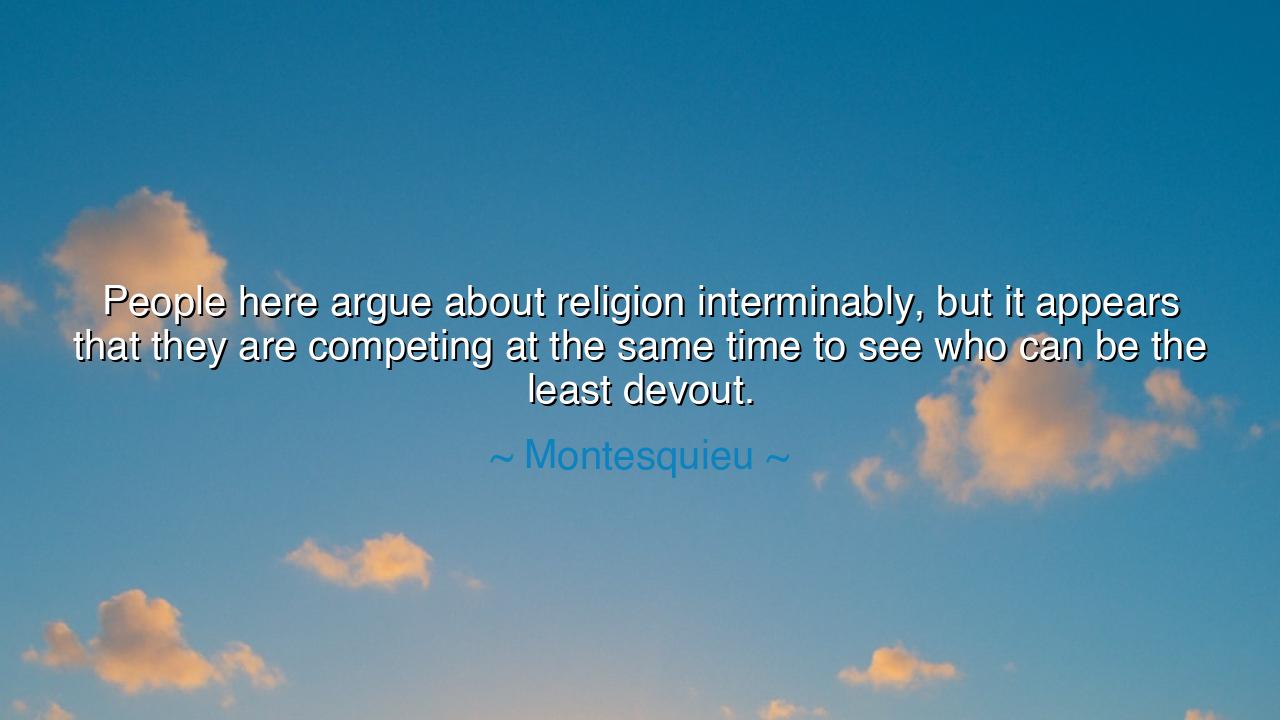
People here argue about religion interminably, but it appears
People here argue about religion interminably, but it appears that they are competing at the same time to see who can be the least devout.






The words of Montesquieu — "People here argue about religion interminably, but it appears that they are competing at the same time to see who can be the least devout." — are a sharp mirror held up to human nature. In them, he exposes a paradox: that men may endlessly quarrel over the forms of religion, debating doctrines, disputing rituals, and defending sects, yet at the same time fail to embody the spirit of devotion such debates supposedly protect. His words carry both irony and sorrow, for they reveal the hollowness of religion without reverence, of words without deeds, of faith reduced to contest rather than lived conviction.
The origin of this wisdom lies in Montesquieu’s keen observation of European society in the Age of Enlightenment. He lived in a time when religious wars, persecutions, and disputes still scarred nations. Theologians and rulers alike invoked faith to justify their divisions, while many among the educated elite grew increasingly cynical, treating piety as a matter of appearance rather than substance. Montesquieu saw that in such societies, religion often became less about true devotion to the divine and more about argument — a contest of wit, authority, or prestige. In this way, he exposes the danger of hollow religiosity: men can argue for heaven with their lips, yet live for earth with their hearts.
History provides us with clear examples. Consider the court of Louis XIV in France. The king, while promoting Catholic orthodoxy and revoking the Edict of Nantes to persecute Protestants, presided over a court that indulged in vanity, excess, and hypocrisy. Religion was used as a weapon against dissent, but the very spirit of Christ’s humility and compassion was absent. Those who should have been models of devotion were instead competing in luxury, intrigue, and pride. Thus, Montesquieu’s words strike with precision: they argued for religion but lived as though devotion were weakness.
We may also recall the Byzantine Empire before its fall. Chroniclers tell us that even as the Turks advanced upon Constantinople, scholars and clergy argued bitterly about the procession of the Holy Spirit and other theological subtleties. While walls trembled and swords clashed, men debated doctrines with no power to save their city. Here too was Montesquieu’s paradox: endless arguments about religion, but little sign of living devotion to the virtues of courage, unity, and sacrifice that faith should have inspired.
The meaning of his words is therefore timeless: true religion is not a matter of endless dispute but of lived piety, reverence, and virtue. To compete in cleverness about faith while neglecting its essence is to betray both faith and reason. The divine is not honored by sharp tongues or endless quarrels, but by hearts aligned with truth, by lives lived with justice, mercy, and humility. To lose sight of this is to let religion become a game of pride rather than a path to God.
The lesson for us is profound: beware of empty argument. Do not waste your spirit in disputes that seek victory rather than truth. Instead, strive to embody devotion in quiet integrity. Let your religion not be measured by how well you can argue for it, but by how deeply you live it. If faith is true, it should manifest in compassion, in honesty, in courage. Without these, even the fiercest defender of religion becomes, as Montesquieu observed, less devout than those he seeks to oppose.
What, then, should you do in practice? Live the essence of your faith. Debate if you must, but never let argument replace devotion. Pray if you believe; meditate if you seek; serve others in love, for these are the marks of sincerity. And when you see disputes about religion arise, remember Montesquieu’s wisdom: do not seek to outshine others in words, but let your devotion speak for itself.
Thus let this teaching endure: religion without devotion is emptiness, and arguments without reverence are vanity. Let men not compete in cleverness, but in goodness. For in the end, the divine is not glorified by endless quarrels, but by the radiance of lives lived with faith, humility, and love.






AAdministratorAdministrator
Welcome, honored guests. Please leave a comment, we will respond soon